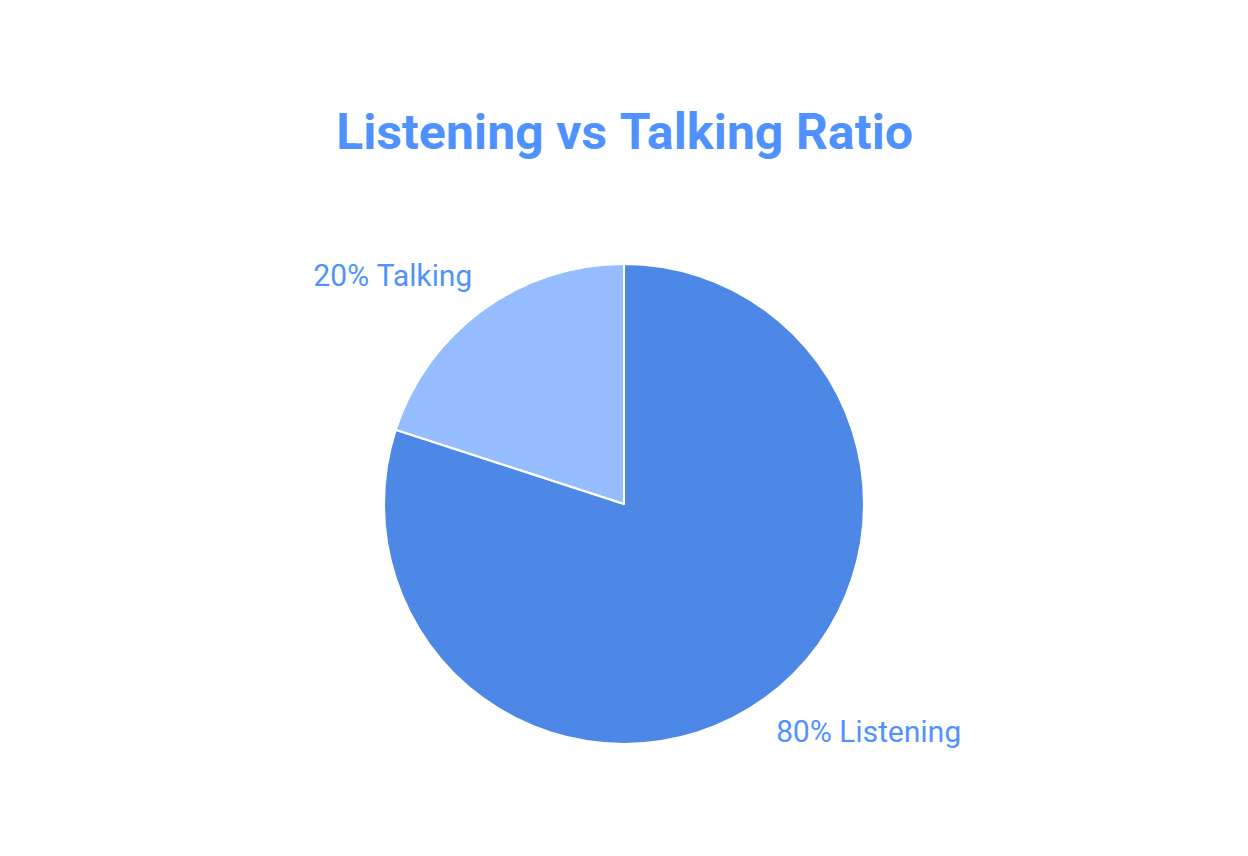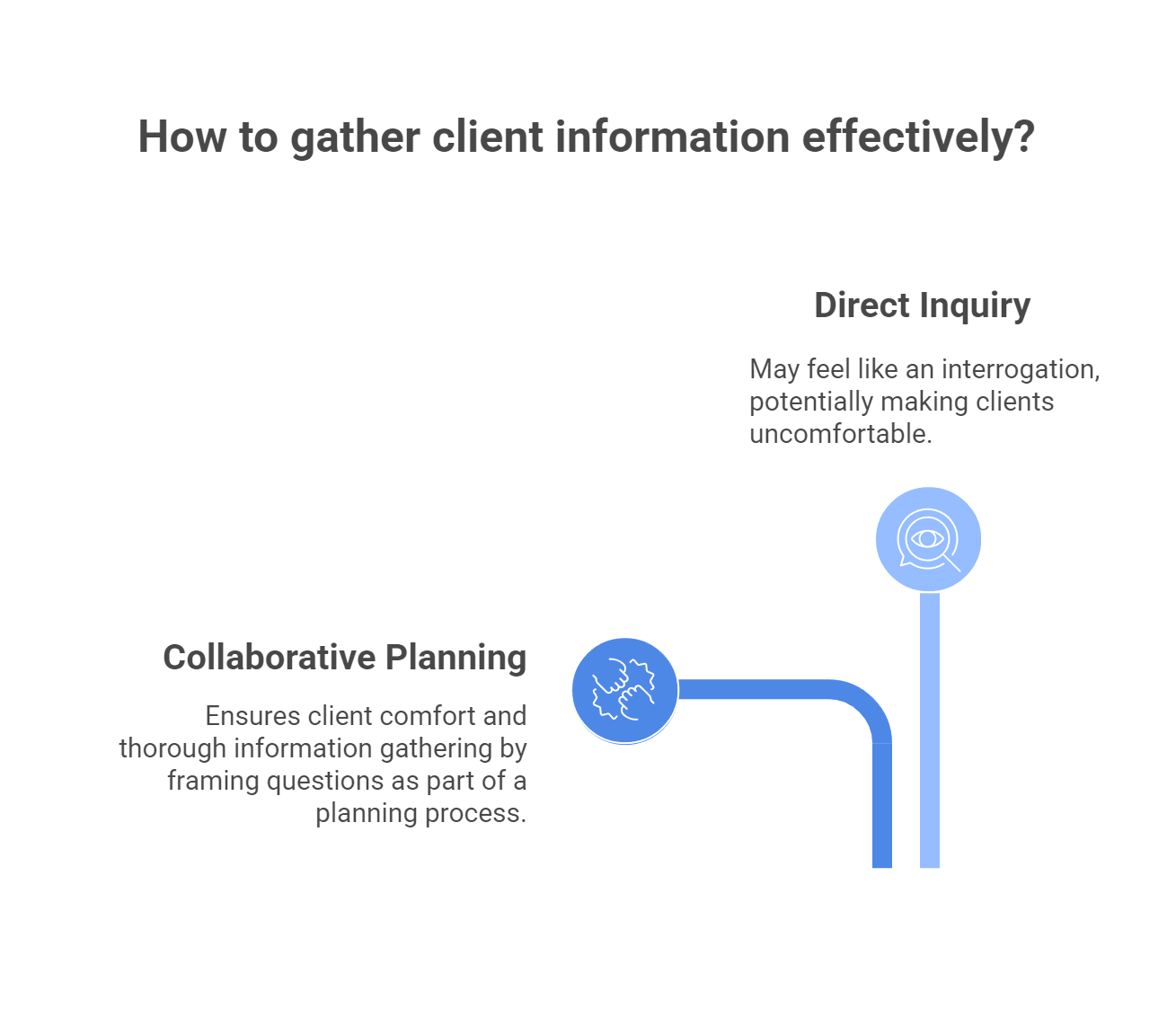The Modern Agent's Approach to the Art of Conversation
Communication in real estate transforms casual inquiries into committed clients and uncertain homebuyers into confident decision-makers. Though I think what gets overlooked is how much these conversation skills actually matter for everything else that follows.
The scripts and techniques in this guide can elevate client interactions, streamline transactions, and build lasting relationships.
But they only work if you actually use them consistently.
The importance of effective communication
Strong communication serves as the foundation for every transaction. When agents master conversation skills, they create an environment where clients feel understood, informed, and confident in their decisions.
This trust-building process directly impacts both immediate sales and long-term business growth. Practicing conversations effectively means focusing on understanding common scenarios and developing communication strategies that actually work.
You need to practice introductions, qualifying questions, handling objections, and closing deals. Role-playing with a partner or using scripts provides preparation for actual client interactions, though it can feel awkward at first.
Research shows that communication skills directly correlate with business success. Strong communication leads to increased client referrals, faster transaction times, and higher client satisfaction ratings across the industry.
Which makes sense when you think about it - nobody wants to work with someone they can't talk to comfortably.
Advanced techniques for effective conversations
1. Lead with curiosity
Open-ended questions create space for clients to express their true needs and concerns. This curiosity-driven approach moves beyond surface-level preferences to uncover the emotional drivers behind major housing decisions.
Be genuine and empathetic - show authentic interest in client needs while listening actively to their responses and concerns.
Curiosity-driven questions:
What are your biggest concerns about buying/selling a property?
How do you envision your ideal home?
What has been your experience with agents in the past?
Each question serves a purpose, though perhaps not always the obvious one. The first identifies potential obstacles.
The second reveals lifestyle priorities. The third provides insight into past experiences that may influence current expectations.
Sometimes clients surprise you with their answers.
2. The 80/20 listening rule
Success depends more on listening than talking. The 80/20 rule - listening most of the time while speaking only when necessary - allows agents to gather crucial information while positioning themselves as trusted advisors rather than aggressive salespeople.
Be transparent and honest throughout these conversations. Avoid making promises that cannot be kept, and be professional and confident to project expertise and reliability.
Technology can help agents master this listening-focused approach through AI coaching systems that analyze talk-time ratios and provide real-time feedback on conversation balance. Tools like MaverickRE track communication patterns to ensure optimal listening practices and identify areas for improvement.
Active listening techniques enhance this approach. Paraphrasing what the client says to confirm understanding.
Asking follow-up questions based on their responses. Using non-verbal cues like nodding and maintaining eye contact.
This listening-focused strategy builds rapport naturally while gathering the detailed information needed to serve clients effectively.
3. The FORM method for small talk
The FORM method provides a structured approach to building initial connections with homebuyers and sellers. This technique transforms awkward first meetings into comfortable conversations that reveal important background information.
Though it can feel mechanical until you get used to it.
Family: "How is your family adjusting to the move?"
Occupation: "What do you enjoy most about your job?"
Recreation: "What hobbies do you pursue in your free time?"
Message: Transition into discussing their needs.
Each element serves to humanize the relationship while uncovering details that inform housing recommendations and timing considerations. Sometimes the recreation part reveals more about their lifestyle needs than direct housing questions do.
Essential conversation components
Initial contact & introduction
First impressions often determine whether a potential client chooses to work with an agent or continues their search elsewhere.
The initial contact must accomplish several objectives simultaneously - establish credibility, demonstrate market knowledge, and create personal connection.
All without sounding like you're reading from a script.
An effective introduction follows this structure:
"Hi [Client Name], I'm [Your Name] from [Your Company]. I specialize in [property type] in [location]. I understand you're interested in [buying/selling]. Would you have a few minutes to chat about your needs?"
This approach immediately communicates specialization and market focus while respectfully requesting permission to continue the conversation. Though some agents prefer a more casual approach depending on the situation.
Qualifying questions
Understanding client needs, budget, timeline, and preferences requires systematic inquiry. Effective qualifying questions gather essential information without feeling like an interrogation.
The key lies in framing these questions as collaborative planning rather than data collection, ensuring thorough information gathering while maintaining client comfort.
"To best help you, could you tell me a bit more about what you're looking for in a property? For example, what's your ideal location, number of bedrooms/bathrooms, and desired price range?"
This phrasing positions the agent as a helpful resource while gathering the specific details needed to provide targeted service. Sometimes clients aren't ready to share budget information immediately, which is fine - you can circle back to it.
Closing the deal
Securing client commitment requires confidence balanced with respect for the client's decision-making process.
Effective closing statements summarize the value proposition while providing a clear next step.
"Based on what we've discussed, I believe this property is a great fit for your needs. Are you ready to move forward with an offer?"
This direct approach respects the client's time while creating momentum toward transaction completion. Though some situations call for a softer approach if you sense hesitation.
Handling difficult conversations with confidence
Transactions inevitably involve challenging moments that test communication skills. Whether addressing pricing concerns, inspection issues, or financing complications, agents must navigate these conversations with professionalism while protecting their clients' interests.
When clients express concerns about pricing, acknowledge their perspective while providing market context. If a client says,
"This house is too expensive," respond with: "I understand your concern about the price. This home is priced competitively based on recent sales in the area though. It also offers [mention unique features] that add value. Let's discuss how we can potentially negotiate a price that works for both of us."
Effective difficult conversation management also requires systematic follow-up protocols.
Implementing structured communication schedules ensures consistent client contact and helps prevent minor concerns from becoming major obstacles.
Automated systems can support these efforts by ensuring no client communication falls through the cracks.
Important strategies:
Be transparent when you don't know an answer. Offer to find the information or connect them with an expert.
Frame challenges positively. Instead of saying "This needs a lot of work," say "With a few updates, this could be a fantastic investment."
Practice empathy. Acknowledge their feelings and concerns to build trust.
These strategies maintain relationships while addressing legitimate concerns constructively. Though sometimes you just have to let clients vent before moving toward solutions.
Practical scenarios for skill development
Understanding conversation quality goes beyond subjective assessment.
Effective agents track key indicators such as appointment setting success, meaningful conversation duration, and follow-up completion rates.
Regular performance review helps identify strengths and areas requiring additional practice or coaching support.
Scenario 1: Open house greeting
Open houses present unique communication challenges. Visitors arrive with varying levels of interest and different comfort levels with agent interaction.
When greeting hesitant visitors, warmth and being approachable create an inviting atmosphere without pressure.
Effective approach: Be welcoming and use open-ended questions to understand their needs. Offer assistance while asking if they are looking to buy or simply exploring the neighborhood.
Some people just want to look around without talking much, which is fine too.
Scenario 2: Neighbor conversations
Neighbors who attend open houses often provide unexpected opportunities for future business. These conversations require a different approach than typical buyer interactions, focusing on relationship-building rather than immediate sales objectives.
Strategy: Thank them for stopping by and acknowledge their local expertise. Ask about their experience in the neighborhood and transition naturally to discussing current market conditions.
This approach may reveal future selling opportunities or referral possibilities. Neighbors often know things about the area that aren't obvious from listing information.
Scenario 3: Price objections
Price objections require careful handling to maintain client relationships while protecting property values. The response must acknowledge client concerns while providing factual support for current pricing.
Approach: Acknowledge their concern and offer to review comparable sales in the area. Present recently sold properties with similar features and explain how the current property compares to other available options.
Sometimes the objection isn't really about price - it might be about value or their comfort level with the market.
Scenario 4: Post-inspection negotiations
Inspection results often create tension between buyers and sellers. Agents must facilitate productive discussions that address legitimate concerns while keeping transactions on track.
Strategy: Present findings calmly, prioritizing issues by importance. Focus on safety concerns first, then address items that affect property value.
Propose practical solutions such as seller repairs for critical issues and buyer credits for minor concerns.
Top-performing agents often practice these scenarios through structured coaching sessions with regular performance reviews and feedback cycles to ensure consistent improvement and skill refinement.
Scenario 5: Exclusive representation
Clients who want to work with multiple agents present a common challenge. The conversation must demonstrate the value of exclusive representation without criticizing other agents or approaches.
Response: Explain that exclusive agreements allow for dedicated attention and comprehensive service. Emphasize the benefits of focused effort, including thorough property research and network utilization that provides competitive advantages in fast-moving markets.
Though some clients need time to think about this decision.
Resources for continued improvement
Skill development in communication requires ongoing practice and refinement.
Follow up promptly with clients and maintain consistent communication throughout the transaction process to reinforce relationships.
Effective development resources include:
Role-playing: Practice with colleagues or mentors to refine responses and build confidence
Scripts: Use sample scripts as foundations, adapting language to match personal communication style
Courses: Enroll in programs focused on communication techniques and sales methodology
AI Coaching Platforms: Use technology that provides simulated client interactions with real-time feedback, performance scoring, and detailed analytics on conversation quality and effectiveness
MaverickRE offers sophisticated alternatives to traditional practice methods. Our AI-powered coaching platform can simulate real client interactions, providing immediate feedback and performance scoring.
These systems allow agents to practice conversations repeatedly while receiving detailed analytics on communication effectiveness and objection handling skills.
Regular practice with these resources builds the muscle memory needed for confident client interactions in high-pressure situations. Though nothing completely replaces real-world experience with actual clients.
Stop guessing if your conversations actually work
Mastering these conversation techniques takes practice, feedback, and consistent improvement. While you now have the scripts and strategies, implementing them effectively requires ongoing coaching and performance tracking.
MaverickRE provides real-time conversation grading, automated feedback, and detailed analytics that help you refine these exact skills.
From tracking your listening ratios to scoring your objection handling, this proven system accelerates your conversation mastery while providing the accountability you need.
👉 Don't just learn these techniques—master them with precision. Book your free demo today and see how top-performing agents are doubling their conversions.




